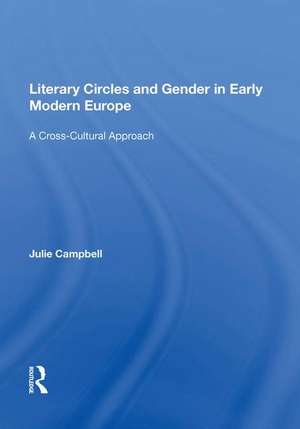Literary Circles and Gender in Early Modern Europe: A Cross-Cultural Approach
Autor Julie Campbellen Limba Engleză Paperback – 9 aug 2018
Preț: 259.51 lei
Preț vechi: 326.26 lei
-20% Nou
Puncte Express: 389
Preț estimativ în valută:
49.67€ • 53.97$ • 41.75£
49.67€ • 53.97$ • 41.75£
Carte tipărită la comandă
Livrare economică 21 aprilie-05 mai
Preluare comenzi: 021 569.72.76
Specificații
ISBN-13: 9781138623583
ISBN-10: 113862358X
Pagini: 229
Dimensiuni: 153 x 219 x 28 mm
Greutate: 0.43 kg
Ediția:1
Editura: Taylor & Francis
Colecția Routledge
Locul publicării:Oxford, United Kingdom
ISBN-10: 113862358X
Pagini: 229
Dimensiuni: 153 x 219 x 28 mm
Greutate: 0.43 kg
Ediția:1
Editura: Taylor & Francis
Colecția Routledge
Locul publicării:Oxford, United Kingdom
Cuprins
Contents: Introduction; Tullia d'Aragona, Sperone Speroni, and the inscription of Salon Personae; The Querelle over Silvia: La Mirtilla and Aminta in dialogue; Pastoral defenses and the nymphs of the Salon Vert; Louise Lab l'Imparfaicte Amye; The Amyes of the English court; Querelle resonance and literary circle ritual in English romances; Conclusion; Bibliography; Index.
Notă biografică
Julie Campbell (English, Eastern Illinois University) is the editor and translator of Isabella Andreini's La Mirtilla (2002) and the author of Literary Circles and Gender in Early Modern Europe (2006). Her research focuses on Renaissance and seventeenth-century literature with an emphasis on Continental and English women writers.
Descriere
A comparative analysis, this study examines the interactions of early modern male and female writers within the context of literary circles. In particular, Campbell examines how the querelle des femmes as a discursive rhetorical tradition of praise and blame influenced perceptions of well-educated women who were part of literary circles in Italy, France, and England from approximately 1530 to 1650. To gain a better sense of how querelle language and issues were used for or against learned women writers, Campbell aligns selected works by female and male writers, pairing them to analyze how the woman writer responds, deflects, or rewrites the male writer's ideological script on women
